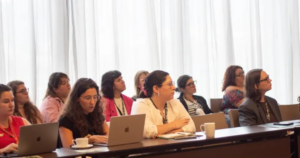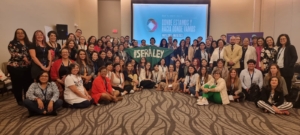In a historic hearing, the IACHR was informed of the regression of gender policies and access to sexual and reproductive health in Argentina and the State’s failure to comply with its obligations. The economic justification of the cuts by the Government was not accepted by the Commission. Its President and the commissioners present affirmed the existence of gender violence and stressed the need for specific measures to address it. “What is not named does not exist,” they said.
“Below, we offer a google translate version of the original article in Spanish. This translation may not be accurate but serves as a general presentation of the article. For more accurate information, please switch to the Spanish version of the website. In addition, feel free to directly contact in English the person mentioned at the bottom of this article with regards to this topic”.
The Inter-American Commission on Human Rights of the Organization of American States (IACHR-OAS) summoned the Argentine State on Thursday, November 14, 2024, to its headquarters in Washington DC, to explain the serious regression in gender policies, in policies on sexual and reproductive rights and the lack of compliance with international commitments. Civil society organizations had requested the hearing in order to present evidence of this setback in the rights of women, girls, adolescents and LGBTIQ+ people in Argentina.
During the hearing, the commissioners asked the representatives of the Argentine Government present to provide answers regarding the coordination of public policies without a budget; to specify which programs are still in force and what measures they will take to strengthen the administration of justice in cases of gender violence. The Government did not respond to the Commission’s questions, nor did it mention how it will comply with its commitments. It only limited itself to recognizing the lack of budgetary attribution to these policies as an error and promised to make an addendum to the national budget.
Meanwhile, at the United Nations General Assembly, Argentina was the only country to vote against the prevention of violence against women and girls, with 170 votes in favour and 13 abstentions.
Civil society organizations urged the IACHR to recommend that the Argentine State adopt concrete policies that guarantee compliance with its international commitments and ensure the right of women, girls, adolescents, and LGBTIQ+ people to live free from violence and to guarantee access to sexual and reproductive health services. This hearing was an urgent call to action: our country must stop the dismantling of fundamental policies and resume its commitment to human rights, so that the basic rights of its citizens do not depend on regressive political decisions.
The voice of organizations
In their interventions before the Commission, Amnesty International, the Center for Legal and Social Studies (CELS), the Latin American Team for Justice and Gender (ELA), the Mujeres x Mujeres Foundation and the Foundation for the Development of Sustainable Policies (Fundeps) presented information that shows the serious setback in public policies aimed at addressing and eradicating gender violence, and guaranteeing access to health services, especially sexual and reproductive health.
“Since taking office on December 10, 2023, the current Argentine government has systematically attacked the rights of women, girls, adolescents, and LGBTIQ+ people. It dismantled successful public policies; it discredited, without evidence, the institutions responsible for guaranteeing them; it arbitrarily cut budget allocations and reduced the staff that supported the implementation of public policies through mass layoffs. With these actions, the State is violating current international pacts and treaties,” said Natalia Gherardi, Executive Director of ELA.
The situation is alarming: in the first quarter of 2024 alone, of the 2,462 women who applied for the Acompañar Program, only 434 received help. This represents a 98% decline compared to 2023, leaving women at extreme risk unprotected. In addition, the budget executed for these programs in 2024 only reaches 15%, directly and critically affecting women and diversities facing situations of violence.
Regarding the dismantling of public policies for access to sexual and reproductive rights, Lucila Galkin, Gender Director of Amnesty International Argentina, stated that “the purchase and distribution of supplies has been the responsibility of the National State since the creation of the National Program for Sexual and Reproductive Health in 2002, and by constitutional mandate the Ministry of Health of the Nation has the authority to govern public policy to establish a minimum level of rights throughout the national territory. However, suddenly and for the first time since then, the State has left the provision of supplies to the provinces, without any type of transfer or transition in order to avoid putting women’s lives and health at risk, which results in a context of absolute inequality.”
Contrary to fundamental international principles
The dismantling of public policies contradicts fundamental international principles and treaties such as the Belém do Pará Convention and CEDAW, which oblige the State to actively intervene. “These measures not only put the lives of women, girls, adolescents and diversities at risk, but also perpetuate structural discrimination based on gender and violate the international commitments assumed by the Argentine State in this area,” said Mayca Balaguer of Fundeps.
What is happening in Argentina has an impact beyond its borders. The lack of protection for women and people of different backgrounds in the country creates a precedent that could legitimize setbacks in other Latin American states, putting at risk the advances in human rights that cost a lot of effort to achieve. “Using the excuse of considering human rights as ineffective and ideologically driven, Argentina is moving away from its historical leadership role in the promotion of women’s rights, initiatives against gender violence, and the promotion and protection of sexual and reproductive rights,” said Juliana Miranda of CELS. The IACHR has repeatedly warned that setbacks in one country affect the entire region, weakening joint efforts to prevent and eradicate gender violence.
The organizations requested that the Commission carry out a visit to the country to observe the situation and prepare a report, given the seriousness of the setback. “We appeal to the IACHR’s commitment to urge the protection of the human right to live a life free of violence and discrimination for all girls, adolescents, women and diversities in Argentina,” concluded Soledad Deza, president of the MxM Foundation.
- Watch the full hearing here.
Contact
Mayca Balaguer, maycabalaguer@fundeps.org



